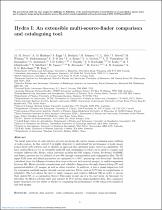| dc.contributor.author | Boyce, M. M. | |
| dc.contributor.author | Hopkins, A. M. | |
| dc.contributor.author | Vaccari, Mattia | |
| dc.date.accessioned | 2023-07-04T08:36:51Z | |
| dc.date.available | 2023-07-04T08:36:51Z | |
| dc.date.issued | 2023 | |
| dc.identifier.citation | Boyce, M. M. et al. (2023). Hydra I: An extensible multi-source-finder comparison and cataloguing tool. Publications of the Astronomical Society of Australia. https://doi.org/10.1017/pasa.2023.24 | en_US |
| dc.identifier.issn | 1448-6083 | |
| dc.identifier.uri | https://doi.org/10.1017/pasa.2023.24 | |
| dc.identifier.uri | http://hdl.handle.net/10566/9190 | |
| dc.description.abstract | The latest generation of radio surveys are now producing sky survey images containing many millions of radio sources. In this context it is highly desirable to understand the performance of radio image source finder (SF) software and to identify an approach that optimises source detection capabilities. We have created Hydra to be an extensible multi-SF and cataloguing tool that can be used to compare and evaluate different SFs. Hydra, which currently includes the SFs Aegean, Caesar, ProFound, PyBDSF, and Selavy, provides for the addition of new SFs through containerisation and configuration files. The SF input RMS noise and island parameters are optimised to a 90% “percentage real detections” threshold (calculated from the difference between detections in the real and inverted images), to enable comparison between SFs. | en_US |
| dc.language.iso | en | en_US |
| dc.publisher | Cambridge University Press | en_US |
| dc.subject | Physics | en_US |
| dc.subject | Astronomy | en_US |
| dc.subject | Radio continuum | en_US |
| dc.subject | Data analysis | en_US |
| dc.title | Hydra I: An extensible multi-source-finder comparison and cataloguing tool | en_US |
| dc.type | Article | en_US |

